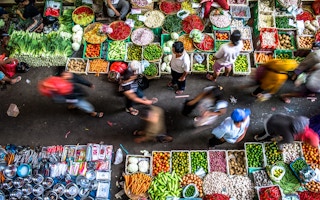Everywhere across the world we waste food. Across high- and low-income countries alike, we lose or waste a third of all the food we produce, which costs the global economy an estimated US$1 trillion every year.
Southeast Asia is no exception. Food loss and waste is a drag on every country in the region.
Each year in Indonesia, US$39 billion of food is lost or wasted, pulling down economic growth. Food loss and waste in Vietnam is estimated to be the equivalent of 2 per cent of gross domestic product. In Philippines, the Department of Agriculture recently estimated that 30 per cent of produce is lost at post-harvest stage due to poor logistics or storage facilities, a tragic waste of valuable nutrition and farmland. And the trends are not encouraging: food waste is estimated to have increased by 30 per cent in Singapore over the last decade.
This is a tragedy for the millions of people in the region who are food insecure, a trend made worse by catastrophic weather events. It is also fueling climate change and the storms ravaging Southeast Asia as food loss and waste is responsible for 8-10 per cent of global greenhouse gas emissions, particularly toxic methane, which is 86 times stronger than carbon dioxide when examining its global warming impacts over a 20-year period.
Today, not a single country in Southeast Asia has committed to reducing food loss and waste as part of its National Determined Contributions under the Paris Agreement yet. As leaders from Southeast Asia head to Baku, Azerbaijan for COP29, it is an opportunity to put plans in place and act to prevent food waste.
One key solution is already playing out across the region: food banking.
Food banks operate under a simple, time-tested model: they recover safe, nutritious food that would otherwise be sent to a landfill and redirect it to people facing food insecurity. Food banks go directly to sources including farmers, food manufacturers, wholesale markets, grocery stores, and hotel buffets, among many others on the supply chain.
The result is a win for all involved as less food ends up in landfills, protecting our planet. Businesses save costs of transporting and dumping good food. And millions more people are able to eat without increasing food production and further straining our natural resources.
While food banking has existed for decades in the United States, Europe, and Latin America, it is still relatively new in Southeast Asia. But we have seen tremendous growth in the scale and geographic reach of food banks in recent years. From 2019 to 2023, nine promising food banks in Southeast Asia that are part of The Global FoodBanking Network’s Accelerator programme increased the number of people served by seventeen times, to 14 million. Over the same period, food recovered and distributed increased tenfold.
Far from an anomaly, the great leap of food banks in Southeast Asia is a sign of the tremendous potential of food recovery and redistribution: today, less than 1 per cent of all lost and wasted food is recovered. Food banks in Southeast Asia see this opportunity and are showing how cooperation between government, the private sector, and civil society can create coalitions to reduce food waste and feed more people.
In Thailand, Scholars of Sustenance Foundation (SOS Thailand) went from recovering food from a few Bangkok hotels in 2016 to recovering 2 million kilograms of surplus food from across the supply chain in four major cities in Thailand last year. They have become a guide for the country’s food donation safety guidelines and are a key partner for the Thailand National Science and Technology Development Agency’s plans to establish a national food bank.
In Philippines, where a third of the children are stunted, Rise Against Hunger Philippines (RAHP) has established an innovative surplus food solution at the Nueva Vizcaya Agricultural Terminal that benefits both the farmers and children in the community. At this trading post, farmers can come to RAHP’s food bank to donate their surplus produce in exchange for food staples and household supplies. The donated fruits and vegetables are then distributed to children in the surrounding schools. In the first nine months of the program, 1.2 million kilograms of surplus fruits and vegetables were received from the farmers and distributed weekly to 5,000 students in the community.
This initiative not only addresses immediate food security needs but also strengthens rural economies and supports community resilience, fostering a model of agricultural sustainability in Nueva Vizcaya and beyond.
Food banks are also helping shape better policy for sustainable food systems. Food banks in Indonesia, Singapore, and Vietnam have partnered with The Global Food Donation Policy Atlas to evaluate laws and provide recommendations that can foster more food donation and less loss and waste.
Things are shifting in the region, with the Asean Leaders’ Declaration on Strengthening Food Security and Nutrition in Response to Crises in 2023 recognising the role of food banks in strengthening food security. Recent bills have been passed in the region, such as Singapore’s Good Samaritan Food Donation Bill after a four-year-long consultation among stakeholders.
Leaders in Southeast Asia have an opportunity to make great strides for people and the planet by supporting food banks making sure no good food goes to waste.
Hazel Quek is the Asia Pacific Regional Director at The Global FoodBanking Network, a food bank network spanning more than 50 countries that works on community-led solutions for hunger.











